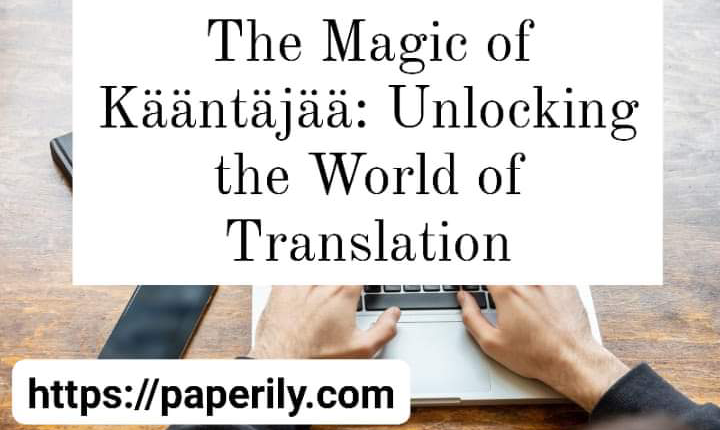The Magic of Kääntäjää: Unlocking the World of Translation
Have you ever wondered about the power of language, how it connects people, and bridges cultural gaps? In a globalized world, the need for translation is more significant than ever. And in the realm of translation, one word stands out: “kääntäjää.” In this exploration of the term, we’ll delve into its meaning, its relevance, and the fascinating world of translators. Whether you’re a language enthusiast or simply curious, join us on this linguistic journey.
Introduction
Language is a beautiful tapestry that weaves through our lives, connecting us to others and helping us communicate our thoughts and emotions. But what happens when we encounter languages we don’t understand? This is where the magic of “kääntäjää” comes into play.
The Meaning of “Kääntäjää”
“Kääntäjää” is a Finnish word that translates to “translator” in English. While it may appear as a simple term, it carries profound significance. Translators are the unsung heroes of communication, working tirelessly to break down language barriers and facilitate understanding between people from different linguistic backgrounds.
The Vital Role of Translators
Translators play a crucial role in various aspects of our lives, often behind the scenes. Here are some key areas where their expertise shines:
1. Literary Translation
Translators bring the world’s literature to a broader audience by translating novels, poetry, and other literary works. Thanks to them, we can explore the literary treasures of different cultures.
2. Business and Commerce
In the global marketplace, effective communication is paramount. Translators enable businesses to expand into international markets, ensuring that contracts, documents, and marketing materials are accurately translated.
3. Diplomacy and International Relations
Translators facilitate diplomacy and negotiations between nations. They ensure that high-stakes discussions and agreements are accurately conveyed between languages.
4. Entertainment Industry
In the world of film and television, translators provide subtitles and dubbing to make content accessible to a wider audience. They bring stories from different corners of the world to our screens.
5. Healthcare and Medicine
In the medical field, precise translation is a matter of life and death. Translators bridge language gaps for doctors, patients, and medical documents, ensuring that healthcare is accessible to all.
Translation Tools and Technology
The field of translation has evolved significantly with the advent of technology. Here are some tools and innovations that have transformed the work of translators:
1. Computer-Assisted Translation (CAT) Tools
CAT tools like SDL Trados and memoQ assist translators in managing large volumes of text. They provide translation memory and terminology databases to maintain consistency.
2. Machine Translation
Machine translation, powered by artificial intelligence, has made strides in recent years. While it can be helpful for basic translations, human expertise remains irreplaceable for complex, nuanced content.
3. Online Platforms
Online platforms like ProZ and TranslatorsCafe connect clients with freelance translators worldwide, making it easier to find specialized language services.
Challenges in Translation
While translation is a noble profession, it comes with its share of challenges. Here are some common hurdles that translators face:
1. Cultural Nuances
Translators must navigate cultural nuances, idioms, and references that may not have direct equivalents in the target language. This requires deep cultural knowledge.
2. Contextual Accuracy
Translators need to capture the context of the original text accurately. Misinterpretation can lead to confusion or even unintended consequences.
3. Language Evolution
Languages are constantly evolving. Translators must stay up-to-date with language changes and adapt their work accordingly.
Conclusion
“Kääntäjää,” or translator, is not just a word; it’s a gateway to understanding and connecting with the world. Translators are the bridge builders who ensure that language is not a barrier but a bridge. Their dedication and expertise enable us to explore diverse cultures, do business globally, and enjoy international art and literature. As we embrace a world that’s more interconnected than ever, let’s appreciate the magic of “kääntäjää” and the invaluable role of translators in our lives.
FAQs
Q1: Can machine translation completely replace human translators?
A1: While machine translation has its uses, especially for quick and simple translations, it cannot replicate the nuanced and context-aware work of human translators, particularly for complex content.
Q2: How long does it take to become a professional translator?
A2: The time to become a professional translator varies depending on factors like language proficiency and specialization. It often requires years of study and practice.
Q3: Is translation an in-demand profession?
A3: Yes, translation is in high demand, especially with globalization. Businesses, governments, and individuals all require translation services for various purposes, ensuring a steady demand for translators.


